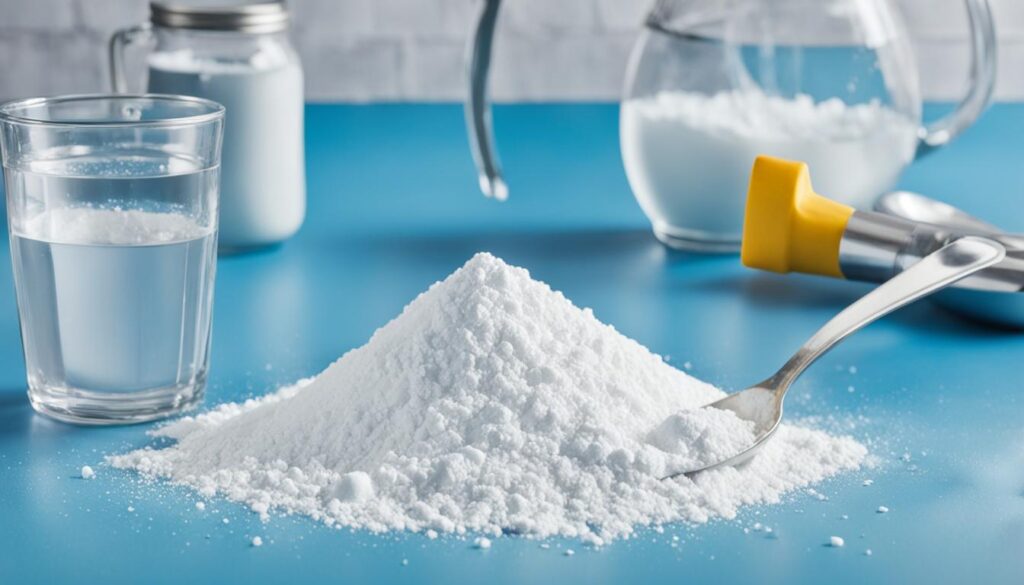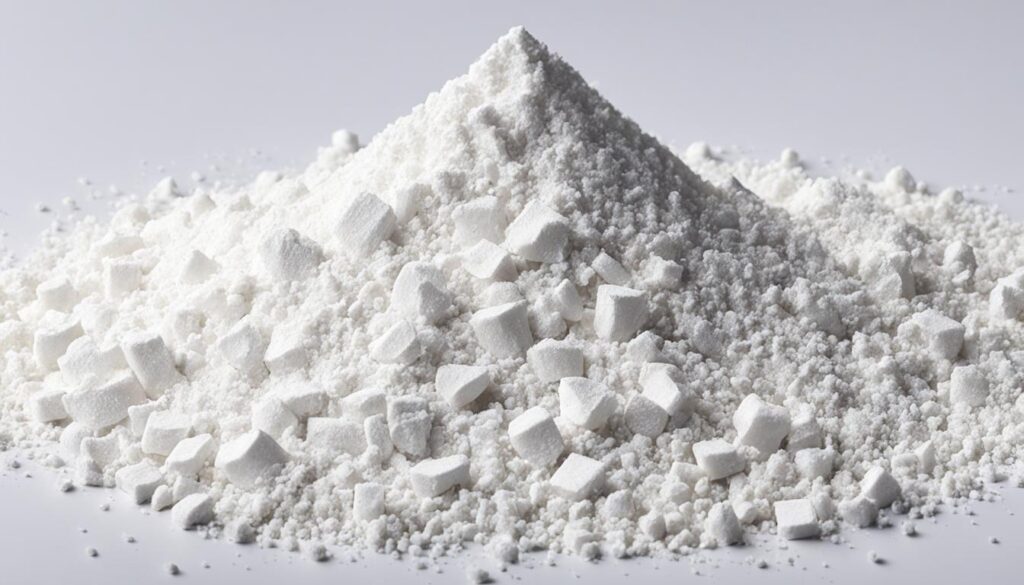Calcium carbonate is a versatile compound with a wide range of applications. It is commonly used in industries, healthcare, and daily life. It has properties that contribute to its various uses, and the key components of calcium carbonate make it beneficial in multiple ways. In this article, we will explore the myriad uses and benefits of calcium carbonate.
Key Takeaways:
- Calcium carbonate is widely used in various industries, healthcare, and daily life.
- Its properties and key components contribute to its versatility and benefits.
- Calcium carbonate has a long history of usage in construction and paper industries.
- Natural usage of calcium carbonate includes culinary and personal products.
- It has household and topical uses such as in cleaning agents and gardening.
History and Origin of Calcium Carbonate

Calcium carbonate has a long history of usage in various industries, showcasing its importance and versatility. Let’s explore its significant contributions in the construction and paper industries.
Calcium Carbonate in the Construction Industry
In the construction industry, calcium carbonate serves as a vital building material, providing strength and durability to structures. Its incorporation enhances the properties of construction materials, making them more robust and long-lasting.
Calcium carbonate acts as an essential ingredient in concrete, contributing to its strength and stability. It enhances the compressive strength and reduces the permeability of concrete structures, making them more resistant to environmental factors such as moisture and chemical exposure.
Calcium Carbonate in the Paper Industry
In the paper industry, calcium carbonate plays a crucial role as a filler material. Adding calcium carbonate to paper pulp improves the paper’s brightness and opacity, enabling it to achieve a higher quality and professional appearance.
The incorporation of calcium carbonate in paper production helps reduce costs by replacing more expensive materials. It also enhances the printing properties of paper, allowing for better ink absorption and resulting in sharper and more vibrant printed images.
“Calcium carbonate’s usage in the construction and paper industries is a testament to its versatility and importance in various applications.”
To gain a better understanding of the significance of calcium carbonate in these industries, let’s look at a comparison of its specific applications:
| Industry | Application | Benefits |
|---|---|---|
| Construction | Concrete production |
|
| Building materials |
|
|
| Paper | Filler material |
|
| Ink absorption |
|
In summary, the usage of calcium carbonate in the construction and paper industries highlights its role in enhancing the strength, durability, and aesthetic properties of building materials and paper products, respectively.
Properties and Key Components of Calcium Carbonate

Calcium carbonate, represented by the chemical formula CaCO3, is a compound consisting of calcium ions (Ca2+) and carbonate ions (CO32-). It possesses several distinctive properties that make it versatile and useful in a wide range of applications.
One of the notable properties of calcium carbonate is its white color, which lends itself well to various industries. Its pure white appearance makes it a desirable ingredient in products that require brightness and high reflectivity. For example, in the paint industry, calcium carbonate is often used as a pigment to enhance the opacity and color of paints and coatings.
Another important property of calcium carbonate is its odorlessness. This characteristic makes it highly suitable for applications where odor is a concern. It allows for its incorporation into products such as pharmaceuticals, cosmetics, and personal care items without compromising their fragrance or desired scent.
Additionally, calcium carbonate is known for its insolubility in water. It exhibits low solubility, which means it does not readily dissolve in water and remains stable under normal conditions. This property makes calcium carbonate ideal for applications that require high stability and resistance to water-related degradation. An example of such usage is in the manufacturing of building materials, where calcium carbonate is incorporated as an additive to enhance the strength and longevity of concrete and other construction materials.
“The properties of calcium carbonate—its white color, odorlessness, and insolubility in water—make it a sought-after compound in various industries, from paints and coatings to construction materials.”
The properties discussed above highlight the value and versatility of calcium carbonate in numerous applications. Whether as a pigment, an additive, or an ingredient, its properties contribute to its widespread usage across industries.
| Properties of Calcium Carbonate | |
|---|---|
| Chemical Formula | CaCO3 |
| Color | White |
| Odor | Odorless |
| Solubility in Water | Insoluble |
References
- Reference 1
- Reference 2
- Reference 3
Natural Usage of Calcium Carbonate

Calcium carbonate, a naturally occurring mineral, has been utilized for centuries in various culinary and personal products. Its abundance in nature makes it a readily available source of calcium, benefiting both our health and everyday routines. Let’s explore the natural uses of calcium carbonate in culinary and personal care applications.
Dietary Supplementation for Bone Health
Calcium carbonate serves as a popular dietary supplement due to its high calcium content. Our bodies require calcium for healthy bones and teeth, and supplementing our diet with calcium carbonate can help meet these nutritional needs. Incorporating calcium-rich foods into our meals, such as dairy products and leafy greens, along with calcium carbonate supplements, can support bone health and help prevent conditions like osteoporosis.
Abrasive and Absorbent Properties in Personal Care Products
Calcium carbonate’s abrasive properties make it a key ingredient in toothpaste formulations. Its gentle and effective nature aids in removing plaque and stains from our teeth, contributing to a brighter and healthier smile. Furthermore, the absorbent nature of calcium carbonate proves beneficial in cosmetic and skincare products. It helps control excess oil, absorbs moisture, and provides a smooth texture to creams, lotions, and powders.
“Calcium carbonate’s versatility in culinary and personal care applications stems from its natural source of calcium and its abrasive and absorbent properties.”
As a natural and multi-purpose ingredient, calcium carbonate continues to find its place in our culinary creations and personal care routines. Its benefits extend beyond these realms, making it a versatile compound with numerous applications.
Household and Other Topical Uses of Calcium Carbonate

Calcium carbonate goes beyond its industrial applications and finds useful roles in various household products. Its unique properties make it a valuable ingredient for cleaning agents, aquarium maintenance, and gardening. Let’s explore some of the practical household uses of calcium carbonate.
Cleaning Agents
Calcium carbonate’s abrasive qualities make it an effective ingredient in cleaning agents. Whether it’s removing stubborn stains or lifting dirt, calcium carbonate helps attain a clean and polished surface. From kitchen countertops to bathroom tiles, products containing calcium carbonate provide a powerful cleaning solution.
Aquarium Maintenance
In aquariums, calcium carbonate serves as an essential component for maintaining pH levels and ensuring the well-being of aquatic life. It helps stabilize the water’s acidity and provides a source of essential minerals that promote the growth and health of fish and other aquatic organisms.
Gardening
Calcium carbonate is a valuable tool for gardeners. It can neutralize soil acidity, facilitating optimal nutrient absorption by plants. Gardeners often use calcium carbonate-based products to enhance soil quality and create a favorable environment for plant growth.
To summarize, calcium carbonate finds its way into our homes through a variety of products. Whether it’s keeping our living spaces clean, maintaining aquariums, or nourishing plants in our gardens, calcium carbonate’s versatility makes it an invaluable asset in everyday life.
Benefits and Applications of Calcium Carbonate

The benefits of calcium carbonate are extensive. In healthcare, it is used as a dietary supplement to promote bone health and prevent conditions like osteoporosis. It is also utilized in pharmaceuticals for its antacid properties and as an ingredient in medications. In cosmetics, calcium carbonate contributes to the smooth texture of products. Moreover, it is an important component in agricultural practices, providing plants with essential nutrients for growth.
Calcium carbonate offers numerous health benefits, making it a popular choice for dietary supplements. It helps maintain bone health by providing the necessary calcium required for strong bones and teeth. Regular intake of calcium carbonate can help prevent conditions such as osteoporosis, particularly among postmenopausal women.
“Calcium carbonate is an important ingredient in pharmaceuticals due to its antacid properties. It helps neutralize excess stomach acid, providing relief from heartburn, acid indigestion, and other related symptoms.” – Dr. Nicole Anderson, Pharmacist
In the field of cosmetics, calcium carbonate is widely used for its ability to provide a smooth and even texture to various products. It is commonly found in foundations, powders, and creams, contributing to their ease of application and blendability. Additionally, calcium carbonate has absorbent properties, helping to control excessive oil production, making it an excellent ingredient for skincare and oil-control products.
Calcium carbonate also has essential applications in agriculture. It is used as a source of calcium, an important nutrient for plant growth and development. Incorporating calcium carbonate into soil helps improve soil fertility and supports healthy root and plant growth. It aids in neutralizing soil acidity, enhancing nutrient availability, and promoting better overall plant health.
Calcium Carbonate Applications:
| Industry | Applications |
|---|---|
| Healthcare | • Dietary supplements for bone health • Antacids in pharmaceuticals |
| Cosmetics | • Foundation and powder formulations • Skincare and oil-control products |
| Agriculture | • Soil amendment to improve fertility and pH balance • Nutrient source for enhanced plant growth |
As demonstrated in the above table, calcium carbonate finds application in various industries, each benefiting from its unique properties and versatility. Whether it is promoting bone health, aiding digestion, enhancing the texture of cosmetics, or improving agricultural practices, calcium carbonate plays a significant role in our everyday lives.
Usage Tips and Cautions for Calcium Carbonate

When it comes to using calcium carbonate, following proper guidelines and exercising caution is crucial for optimum results and safety. Here are some useful tips and cautions to keep in mind:
- Follow the recommended dosage: It is important to adhere to the dosage instructions provided by a healthcare professional or as indicated on the product label. Taking the correct amount of calcium carbonate ensures its effectiveness and minimizes the risk of potential side effects.
- Take with food: Calcium carbonate is typically consumed with food or following meals. This helps enhance its absorption and prevents digestive discomfort that may occur when taken on an empty stomach.
- Caution for individuals with kidney disease: If you have kidney disease or any related conditions, it is important to exercise caution when using calcium carbonate. Consult with your healthcare professional to determine the appropriate dosage and monitor your kidney function regularly.
- Be cautious with stomach conditions: Individuals with a history of stomach problems such as ulcers or acid reflux should be cautious when taking calcium carbonate. It is advisable to consult with a healthcare professional to ensure its compatibility with your condition and avoid any potential interactions or aggravation of symptoms.
- Awareness of drug interactions: It is crucial to be aware of potential drug interactions when using calcium carbonate. Certain medications, such as antibiotics, thyroid medications, and osteoporosis drugs, may interact with calcium carbonate, affecting their absorption and effectiveness. Always inform your healthcare professional about any medications you are taking to prevent any adverse effects or reduced efficacy.
- Consult with a healthcare professional: Before incorporating calcium carbonate or any new medication into your routine, consult with a healthcare professional. They can provide personalized guidance based on your specific health needs and ensure the safe and effective use of calcium carbonate.
Incorporating these usage tips and exercising caution will help you make the most of calcium carbonate while prioritizing your safety and well-being.
Remember, always consult with a healthcare professional before starting any new medication or making changes to your healthcare routine.
Selecting the Best Quality Calcium Carbonate

When it comes to choosing calcium carbonate for industrial applications or personal use, prioritizing the quality of the product is essential. Selecting the best quality calcium carbonate ensures optimal performance and reliable results. Here are some key considerations to keep in mind:
1. Industry Standards and Certification
Look for calcium carbonate that meets the required industry standards. This ensures that the product has undergone rigorous testing and certification, guaranteeing its quality and suitability for the intended application. Manufacturers that follow recognized standards demonstrate their commitment to producing high-quality calcium carbonate.
2. Expert Consultation for Industrial Applications
For specific industrial applications, it is advisable to consult with experts in the field. They can provide valuable insights and guidance on selecting the appropriate grade and form of calcium carbonate. Their expertise will ensure that you choose the right product that meets the specific demands of your industry.
3. Analyzing Product Specifications
Thoroughly examine product specifications to understand the composition, particle size, purity, and any additional features of the calcium carbonate. This information will help you determine if the product aligns with your requirements and if it possesses the desired characteristics for optimal performance.
4. Brand Reputation and Customer Reviews
Consider the reputation of the brand or manufacturer when selecting calcium carbonate. Established brands with a positive track record are more likely to deliver products of consistent quality. Additionally, reading customer reviews can provide valuable firsthand insights into the product’s performance, ensuring a well-informed decision.
By considering these factors and conducting thorough research, you can confidently select the best quality calcium carbonate for your industrial applications or personal use. Investing in premium-grade products will contribute to achieving desired results and ensuring efficiency and effectiveness.
Proper Storage of Calcium Carbonate
When it comes to preserving the quality and effectiveness of calcium carbonate, proper storage is crucial. To ensure its longevity, follow these essential storage tips:
Firstly, store calcium carbonate in a tightly closed container to prevent exposure to air and moisture. It is best to use a container specifically designed for storing chemicals to maintain its integrity.
Secondly, keep calcium carbonate at room temperature, away from excessive heat and direct sunlight. Elevated temperatures can lead to degradation and reduce its effectiveness in various applications.
Lastly, avoid storing calcium carbonate in the bathroom or any area with high humidity levels. Moisture can impact its stability and cause clumping or alteration of its properties. Instead, opt for a dry and cool location for storage.
Remember to keep calcium carbonate out of the reach of children and pets. Accidental ingestion can lead to health risks, so it is essential to store it in a secure place.
By following these storage guidelines, you can maintain the quality and efficacy of calcium carbonate for all your needs.
FAQ
What are some common uses of calcium carbonate?
Calcium carbonate is commonly used in industries such as construction, paper, and healthcare. It is also utilized in household products and has various other applications.
What are the benefits of calcium carbonate?
Calcium carbonate offers multiple benefits, including promoting bone health, providing essential nutrients, regulating pH levels, and enhancing the texture of cosmetic products.
How is calcium carbonate used in the construction industry?
Calcium carbonate is used as a building material in the construction industry to provide strength and durability to structures.
How is calcium carbonate used in the paper industry?
Calcium carbonate is used as a filler in the paper industry to improve the brightness and opacity of paper.
What are the properties of calcium carbonate?
Calcium carbonate is white, odorless, and insoluble in water.
How is calcium carbonate used in culinary and personal products?
Calcium carbonate is a natural source of calcium and is used as a dietary supplement. It is also found in toothpaste, cosmetics, and skincare products due to its abrasive and absorbent properties.
How is calcium carbonate used in household products?
Calcium carbonate is used in cleaning agents for its abrasive qualities, helping remove stains and dirt.
What other topical uses does calcium carbonate have?
Calcium carbonate is used in gardening to neutralize soil acidity and in aquariums to regulate pH levels and provide essential minerals for aquatic life.
How is calcium carbonate beneficial in healthcare?
Calcium carbonate is used as a dietary supplement to promote bone health and prevent conditions like osteoporosis. It is also utilized in pharmaceuticals for its antacid properties and as an ingredient in medications.
What should I be cautious of when using calcium carbonate?
It is important to follow recommended dosages and consult with a healthcare professional if you have kidney disease or stomach conditions. It is also essential to be aware of potential drug interactions.
How do I select the best quality calcium carbonate?
Look for calcium carbonate that meets industry standards and has proper testing and certification. Consult with experts to ensure you select the appropriate grade and form for specific industrial applications.
How should calcium carbonate be stored?
Calcium carbonate should be stored in a tightly closed container at room temperature, away from excessive heat and moisture. Avoid storing it in the bathroom and keep it out of reach of children and pets.






